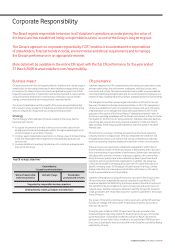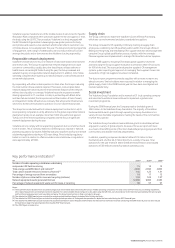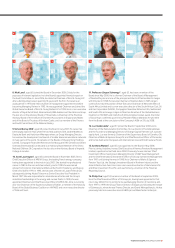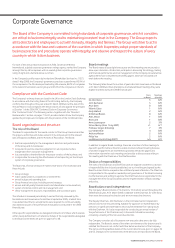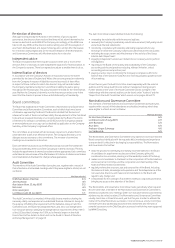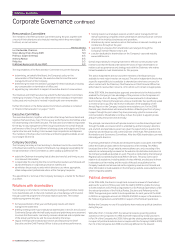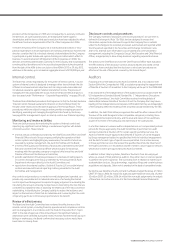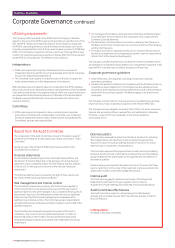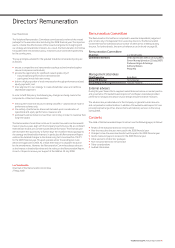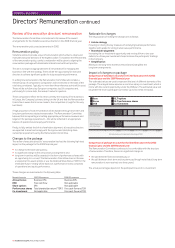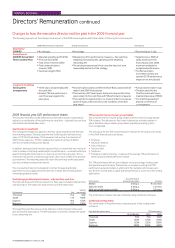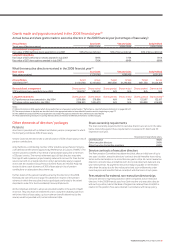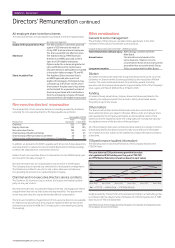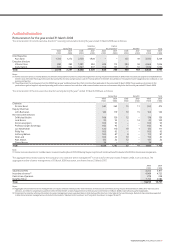Vodafone 2008 Annual Report Download - page 70
Download and view the complete annual report
Please find page 70 of the 2008 Vodafone annual report below. You can navigate through the pages in the report by either clicking on the pages listed below, or by using the keyword search tool below to find specific information within the annual report.
Remuneration Committee
The members of the Remuneration Committee during the year, together with
a record of their attendance at scheduled meetings which they were eligible
to attend, are set out below:
Meetings attended
Luc Vandevelde, Chairman 5/5
Simon Murray (from 23 July 2007) 3/4
Professor Jürgen Schrempp 4/5
Anthony Watson 5/5
Philip Yea 5/5
Dr Michael Boskin (until 23 July 2007) 2/2
The responsibilities of the Remuneration Committee include the following:
determining, on behalf of the Board, the Company’s policy on the
remuneration of the Chairman, the executive directors and the senior
management team of the Company;
determining the total remuneration packages for these individuals, including
any compensation on termination of office; and
appointing any consultants in respect of executive directors’ remuneration.
The Chairman and Chief Executive may attend the Remuneration Committee’s
meetings by invitation. They do not attend when their individual remuneration
is discussed and no director is involved in deciding his own remuneration.
Further information on the Remuneration Committee’s activities is contained
in “Directors’ Remuneration” on pages 71 to 81.
Executive Committee
The executive directors, together with certain other Group functional heads and
regional chief executives, meet 12 times a year as the Executive Committee under
the chairmanship of the Chief Executive. The Executive Committee is responsible
for the day-to-day management of the Group’s businesses, the overall financial
performance of the Group in fulfilment of strategy, plans and budgets and Group
capital structure and funding. It also reviews major acquisitions and disposals.
The members of the Executive Committee and their biographical details are set
out on pages 62 and 64.
Company Secretary
The Company Secretary acts as Secretary to the Board and to the committees
of the Board and, with the consent of the Board, may delegate responsibility for
the administration of the Committees to other suitably qualified staff. He:
assists the Chairman in ensuring that all directors have full and timely access
to all relevant information;
is responsible for ensuring that the correct Board procedures are followed and
advises the Board on corporate governance matters; and
administers the procedure under which directors can, where appropriate,
obtain independent professional advice at the Company’s expense.
The appointment or removal of the Company Secretary is a matter for the Board
as a whole.
Relations with shareholders
The Company is committed to communicating its strategy and activities clearly
to its shareholders and, to that end, maintains an active dialogue with investors
through a planned programme of investor relations activities. The investor
relations programme includes:
formal presentations of full year and half-yearly results and interim
management statements;
briefing meetings with major institutional shareholders in the UK, the US and in
Continental Europe after the half-yearly results and preliminary announcement,
to ensure that the investor community receives a balanced and complete view
of the Group’s performance and the issues faced by the Group;
regular meetings with institutional investors and analysts by the Chief
Executive and the Chief Financial Officer to discuss business performance;
•
•
•
•
•
•
•
•
•
hosting investors and analysts sessions at which senior management from
relevant operating companies deliver presentations which provide an overview
of each of the individual businesses and operations;
attendance by senior executives across the business at relevant meetings and
conferences throughout the year;
responding to enquiries from shareholders and analysts through the
Company’s Investor Relations team; and
a section dedicated to shareholders on the Company’s corporate website,
www.vodafone.com.
Overall responsibility for ensuring that there is effective communication with
investors and that the Board understands the views of major shareholders on
matters such as governance and strategy rests with the Chairman, who makes
himself available to meet shareholders for this purpose.
The senior independent director and other members of the Board are also
available to meet major investors on request. The senior independent director has
a specific responsibility to be available to shareholders who have concerns, for
whom contact with the Chairman, Chief Executive or Chief Financial Officer has
either failed to resolve their concerns, or for whom such contact is inappropriate.
At the 2007 AGM, the shareholders approved amendments to the Articles which
enabled the Company to take advantage of the provision in the Companies Act
2006 (effective from 20 January 2007) to communicate with its shareholders
electronically. Following that approval, unless a shareholder has specifically asked
to receive a hard copy, they will receive notification of the availability of the
Annual Report on the Company’s website www.vodafone.com. For the 2008
financial year, shareholders will receive the Notice of Meeting and form of proxy
in paper through the post unless they have previously opted to receive email
communications. Shareholders continue to have the option to appoint proxies
and give voting instructions electronically.
The principal communication with private investors is via the Annual Report and
through the AGM, an occasion which is attended by all the Company’s directors
and at which all shareholders present are given the opportunity to question the
Chairman and the Board as well as the Chairmen of the Audit, Remuneration and
Nominations and Governance Committees. After the AGM, shareholders can meet
informally with directors.
A summary presentation of results and development plans is also given at the AGM
before the Chairman deals with the formal business of the meeting. The AGM is
broadcast live on the Group’s website, www.vodafone.com, and a recording of the
webcast can subsequently be viewed on the website. All substantive resolutions at
the Company’s AGMs are decided on a poll. The poll is conducted by the Company’s
Registrars and scrutinised by Electoral Reform Services. The proxy votes cast in
relation to all resolutions, including details of votes withheld, are disclosed to those
in attendance at the meeting and the results of the poll are published on the
Company’s website and announced via the regulatory news service. Financial and
other information is made available on the Company’s website, www.vodafone.com,
which is regularly updated.
Political donations
At the 2006 AGM, the directors sought and received a renewal of shareholders’
approval for a period of three years (until the AGM in 2009) to enable the Group
to make donations to EU Political Organisations or EU Political Expenditure, under
the relevant provisions of the Political Parties, Elections and Referendums Act
2000. The approval given restricts such expenditure for each year until the AGM
in 2009 to an aggregate amount of £100,000 (£50,000 in respect of donations to
EU Political Organisations and £50,000 in respect of EU Political Expenditure).
Neither the Company nor any if its subsidiaries have made any political donations
during the year.
With effect from 1 October 2007, the relevant provisions governing political
donations in the Companies Act 1985 have been replaced by similar provisions
in Part 14 of the Companies Act 2006. Although the existing shareholder approval
in respect of political donations does not expire until the Company’s AGM in 2009,
Part 14 of the Companies Act 2006 is technically different to the relevant
•
•
•
•
68 Vodafone Group Plc Annual Report 2008
Vodafone – Governance
Corporate Governance continued



